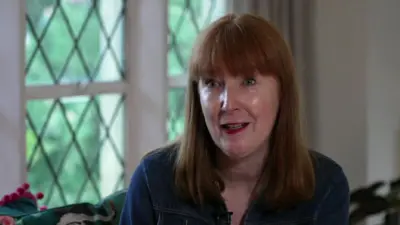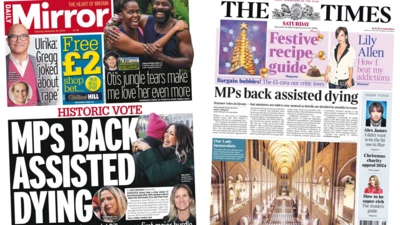We've updated our Privacy and Cookies Policy
We've made some important changes to our Privacy and Cookies Policy and we want you to know what this means for you and your data.
Ministers aim to make Scotland 'tobacco free' by 2034
Top Stories
Plain cigarette packaging is to be introduced in Scotland under a plan to make the nation "tobacco free" by 2034.
The Scottish government said it wanted to see less than 5% of the population choosing to smoke by the target date.
Ministers also pledged to ban smoking in hospital grounds by 2015 and set a target for cutting children's exposure to second hand smoke.
Smoking accounts for more than 13,000 deaths in Scotland each year and is the main cause of early death.
Treating people with smoking-related conditions costs NHS Scotland about ВӘ271m each year.
Top Stories
The Scottish government's plans, , are the latest in a series of measures to cut smoking.
Plain, or "standardised", tobacco packaging is usually free from bright colours and must carry prominent health warnings.
Last December, Australia became the first country in the world to introduce the measure.
However, pro-smoking group Forest said there was no credible evidence that plain packaging would cut youth smoking.
The Scottish government's action plan also includes more money for educational programmes to prevent young people from taking up smoking and a national marketing campaign on the danger of second-hand smoke.
Speaking at Carnegie College in Fife, Public Health Minister Michael Matheson, said: "Our vision of a tobacco-free generation is about reaping the health, social and economic benefits that a significant reduction in smoking would bring - it would be an achievement of which we could all be proud.
"That's why strong and decisive action, like standardised packaging and increased education, are the right steps to prevent young people from taking up smoking."
Top Stories
Scotland became the first part of the UK to introduce a public smoking ban in 2006 and a ban on the display of cigarettes in Scotland's large shops will come into effect on 29 April this year.
Self-service tobacco vending machines will also be banned on the same day, with smaller retailers given until 6 April, 2015, to fully comply with the new legislation.
Introduction of the measure had been delayed because of a legal challenge by manufacturer Imperial Tobacco, which was defeated.
Sheila Duffy, chief executive of anti-smoking group ASH Scotland, welcomed the government strategy, adding: "The tobacco-free generation is a vision well worth striving for - that a child born now in any part of Scotland will reach adulthood breathing clean air, being free from tobacco addiction, and living in a community where to smoke is unusual.
"We owe it to our children to make this happen."
Dr Harpal Kumar, Cancer Research UK's chief executive, said: "We share the Scottish government's vision of a Scotland free from tobacco and the commitment to introduce plain packaging is a real step forward in the fight to protect children from tobacco addiction.
"Replacing glitzy, brightly coloured packs that appeal to children with standard packs displaying prominent health warnings would be a huge public health achievement and give youngsters one less reason to start smoking."
Linda Bauld, Professor of Health Policy, at Stirling University, said studies on the use of plain packaging showed it reduced the appeal of cigarettes and helped tackle misunderstandings about the harmfulness of smoking.
But Forest director Simon Clark, said: "We support all reasonable measures, including education, that will discourage children from smoking.
"Plain packaging is unreasonable because there is no credible evidence that it will have any impact on youth smoking rates.
"What next? Alcohol, fizzy drinks and fast food?"
The UK government is currently considering the results of its own consultation on mandatory standardised packaging.
Scottish ministers said they would await the outcome before deciding on the best legislative option for introducing the measure.
New Zealand is aiming to be tobacco-free by 2025, while Finland has plans to be tobacco-free by 2040.
Top Stories
More to explore
Most read
Content is not available








